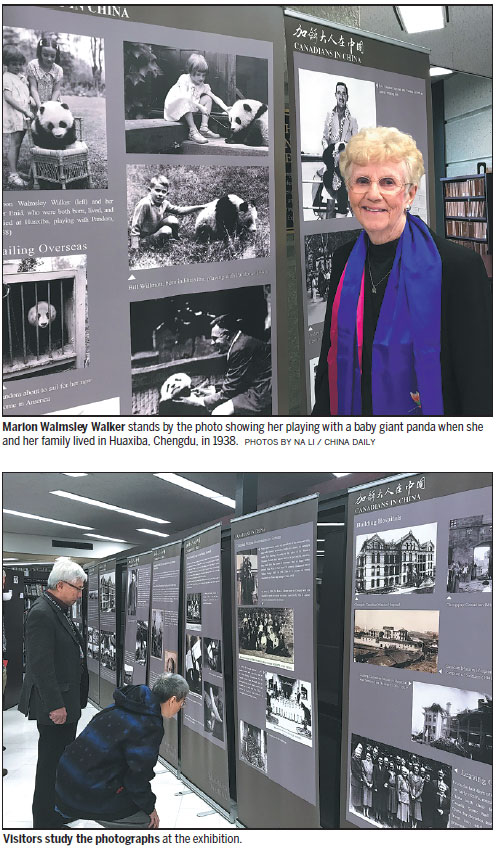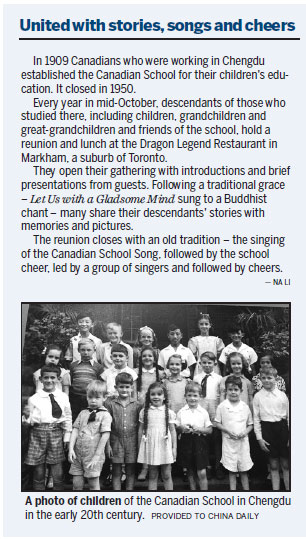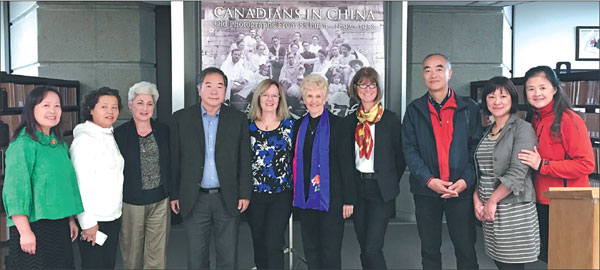FRIENDSHIP FORGED IN THE FURNACE OF TURMOIL
They are little known and almost forgotten, but Canadian missionaries mostly from southern Ontario who traveled to China starting in the late 19th century played a crucial role in the history of Canada-China relations, reports Na Li in Toronto.
Inside the University of Toronto library, a black and white photo that is part of a photo exhibition shows two little girls petting a baby giant panda on a cane chair.
The photo is of Marion Walmsley Walker and her sister playing with the panda named Pandora in Chengdu, Sichuan province, in 1938.
"It has been 68 years since I left the home of my birth and the Canadian School that I loved," said 86-year-old Walker, who attended the photo exhibition last October with her family.
"How many memories are there: of learning, athletics, music, fun and growing up."
The exhibition of archived photographs on the library's eighth floor, Canadians in China: Old Photographs from Sichuan 1892-1952, documents the lives and contributions of Canadian missionary doctors in Sichuan during those eventful years.
In 1891 Walker's grandfather, Doctor O. L. Kilborn, went to Chengdu from Canada with his wife Jennie. In 1910, through joint efforts of missionary organizations of Canada, Britain and the United States, Kilborn and others founded West China Union University.
Walker's parents went to Sichuan from Canada in 1921. Her father, Lewis C. Walmsley, had a good knowledge of Chinese culture. He received a PhD in education from the University of Toronto in 1945. His dissertation was on the education system of classic Chinese literature. He translated the Collected Poems of Wang Wei, in collaboration with Chang Yin-nan.
Three generations of Kilborns served in China for a total of 72 years (61 years in the Chinese mainland and 11 years in Hong Kong), contributing to China's medical science and education. Their service ended with son Leslie Kilborn's retirement.
West China Hospital
"Different groups of specialists got involved in the West China Hospital founded by my grandfather and father, making the hospital quite large," said Doctor Robert Kilborn, the eldest grandson of Doctor O. L. Kilborn, who was born in Emei, Sichuan province, in 1923 and finished junior middle school at the Canadian School and returned to Canada for further education in 1941.
"It included three departments of Western medicine, dentistry and pharmacy. I have to give them a lot of credit for that. They carried on as missionaries to build a Chinese university. He left a legacy behind of a Chinese managed university, Chinese principles, Chinese professors and Chinese self-contained."
The Kilborn Memorial Visiting Professorship Endowment Fund was established by Robert Kilborn to build a continuing relationship between Canadian doctors and the West China Centre of Medical Sciences.
"Sichuan is my home," Kilborn said. "I was born there. I hope the fund can be a start to improve the cooperation between the two universities in medical research and exchange. The Chinese visiting professors can come to Canada back and forth. In reverse, we can choose Canadian students to go to China for research. This has been my dream and goal."
The Kilborn family is among about 500 Canadians who set sail into the uncharted waters of late 19th century China, which was experiencing social unrest at the time.
These missionaries witnessed history unfold, including the end of the last Qing Dynasty (1644-1911), the Japanese invasion in the early 1930s and the subsequent civil war and eventually the birth of the People's Republic in 1949.
The doctors trained by the missionaries became the backbone of a modern medical system in the country in the post-1949 era, said Karen Minden, a University of Manitoba professor who focuses on the missionaries in China between 1892 and 1951 in her book Bamboo Stone: The Evolution of a Chinese Medical Elite.
The Endicotts are another family who lived in Sichuan for three generations. James Gareth Endicott, who was widely known by his Chinese name Wen Youzhang, was born in Sichuan of Canadian missionary parents in 1898. After serving with the Canadian army in France and graduating from the University of Toronto he returned to China and settled in Chongqing in 1925, where he soon became fluent in Chinese.
He worked in Chongqing from 1925 to 1940 and made great contributions during the War of Resistance Against Japanese Aggression (1931-45).
In Canada he became chairman of the Canadian Peace Congress and vice-chair of the World Peace Council. During the Cold War and for more than 40 years he advocated understanding and friendship with the new revolutionary China. But that advocacy led to public controversy with his church and the Canadian government, which at one time considered putting him on trial for treason.
Before he died in 1993 the city of Toronto and York University recognized him as one of Canada's prophetic voices in coming to terms with the march of history in Asia and for promoting the possibility of peaceful coexistence between differing social systems.
Endicott was also honored by the Chinese government with the Peoples' Friendship Ambassador Medal, one of the highest awards given to foreigners, for his consistent support for the Chinese people's revolution and his dedication to the international peace movement.
On his death, Endicott wanted his ashes shared with his parents in Toronto and spread in the waters of the Dadu River at his birthplace, which witnessed the historic milestones of "the Long March", "the people's communes" and the "heroic struggles of the Chinese people".
Stephen Endicott, James' son, was born in Shanghai and grew up in China. He followed in his father's footsteps to devote his life to Sino-Canadian friendship and promote the understanding of China. As a senior scholar at York University he has written several books, including a biography of his father, James G. Endicott: Rebel Out of China.
Returns to Chongqing
In 2005 Stephen returned to Chongqing to celebrate the 60th anniversary of the victory of China's War of Resistance Against Japanese Aggression.
"I spent the first 13 years of my life in Chongqing, the city which I regard as my hometown," he told China Daily. "It has gone through dramatic changes during the past decades. I feel happy for my people."
Donald Willmott, son of the Canadian missionary Leslie Earl Willmott, a friend of James Endicott, was born in 1925 in Renshou, Sichuan.
During China's War of Resistance Against Japanese Aggression, Donald, whose Chinese name was Yun Da-le, worked in the intelligence branch of the US Army and took part in a secret left-wing discussion group along with his parents.
After the war he gained a PhD and taught sociology and Eastern studies in Canada, and he retired in 1995. He was a co-founder of the Toronto chapter of the Canada China Friendship Society, in which he was an active member for many years.
According to a study titled Memorial University's First Sociologist, Donald Willmott and his family's involvement in the social gospel movement, his childhood in China and his American education in sociology shaped his outlook on life and his approach to sociology.
"In his heart, China was always his home," the study said, "In all his life he has worked to carry on the Canada-China friendship to promote peace in the world."
Minden calls these Canadian men and women "scientific missionaries", their powerful vision being the revitalization of China and their legacy passed on to Chinese students being the essence of the collaboration between China and the West.
"The missionaries' story is about the foundation of Canada-China relations," she said.
Contact the writer at renali@chinadailyusa.com
|
Descendants of members of the Canadian School who spent time in China gathered with Chinese friends at the opening of Canadians in China: Old Photographs from Sichuan 1892-1952, held at the University of Toronto on Oct 23, 2017. |


(China Daily 02/20/2018 page6)















